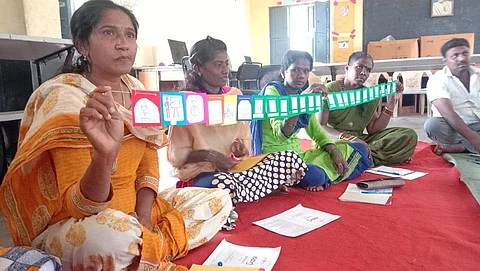

Quality education not only comes from good teachers but resources that are available at the school, believe Santhosh More and Khusboo Awasthi, who are the co-founders of Mantra4Change. Started in 2013 by the duo who worked in the corporate sector for a long time, Mantra4Change's only aim was to change the face of education both in budget non-government schools as well as government schools in Karnataka and other states. But how do they do it? Khusboo explains, "While making resources available in these schools is an important factor, involving all the stakeholders in education is equally important. Therefore, we involve the government officials, headmaster or principal of the schools, teachers, and, of course, the parents, thus transforming the entire school. Unlike others, we don't go and teach the students directly. We feel that involving all the stakeholders is the most sustainable and long-term plan to get better progress."
The team takes up a cluster approach to transform the schools. Khusboo explains, "Mantra4Change has a programme called STEP specially designed to train school teachers. There are several schools that lack resources like proper infrastructure, smart classes, leadership and even teachers — there are schools run with only one or two teachers. This is where STEP plays an important role. Such teachers who run schools single-handedly don't get time to improve on their method of teaching or learning. We tap the data of such teachers, their school result and performance, and train them professionally as well as regularly. By engaging teachers in learning circles, they get to learn the best practices from each other. We also teach them the latest pedagogical methods over rote learning or chalk-and-talk. Technology is another important factor in education today. Hence, we make them aware of the different platforms they can introduce in their classrooms to make learning fun and interesting for kids."
If you assume that this programme happens for a few days, then you are wrong. Mantra4Change knows that it is important to handhold teachers for a long time to make a positive impact over time. Therefore, their STEP programme is for two years to ensure the sustainability of change in these schools. Similarly, the NGO has another programme called PACE meant only for government schools. Khusboo explains, "Under PACE, we form a cluster of 10 to 15 schools and involve both teachers, principal as well as School Development Monitoring Committee members to work together on a project to improve their schools. These teachers are trained to create Vibrant Cluster Resources Centres where they gather for meetings, share their teaching-learning methods and discuss what needs to happen at the schools."
When we ask if the PACE programme has been successful in any particular cluster, Khusboo says, "There are many places where this programme has become successful but the Dommasandra cluster, on the outskirts of Bengaluru, is the one that has yielded great results. The cluster of teachers and principals get together every year to hold a huge enrolment drive along with the children of their school. This year, it was not possible to hold this drive due to the pandemic." She adds that Mantra4Change has been able to make a positive impact through PACE for more than 100 teachers so far.
What next when there is uncertainty regarding the opening of schools? The team has ensured to take their programmes online for the clusters that already exist with them. Not only for teachers, this time, Mantra4Change is conducting similar online programmes for the kids as well. "With such a long gap for children from their studies, they tend to forget what they have learnt in the previous years or, in many cases, they drop out from school. Therefore, there are regular online classes for the kids who can afford internet and smartphones and for those who can't, they have been providing worksheets to keep them updated," she concludes.
